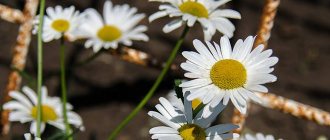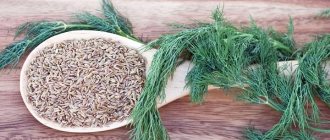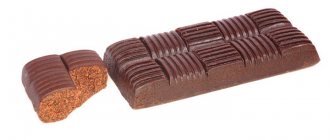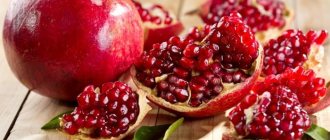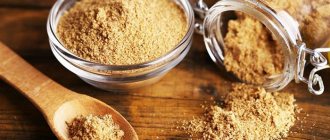Views - 7,459
Mothers don’t hear enough advice when they don’t have enough milk! Then they put the fur to their chest, and feed while the water is running in the shower, and sleep with the child together, and drink “No-shpu”, and save themselves with homeopathy... But there is a simple and effective remedy that has been used in folk medicine for about two thousand years . This is a herb with the beautiful name lemon balm.
- Lemon Balm Ingredients
- Use in therapy
- Benefits for nursing mothers
- How to use lemon balm?
Seasoning
- Tea
- Herbal decoction
- As an additive to other teas
- Video - What and how much should you drink? How much water should a nursing mother drink? Do herbs and teas help increase lactation?
Where to look for lemon balm?
Lemon balm is the second name for lemon balm, which characterizes the aroma and taste. Grass grows along forest edges, in ravines and gorges, and in shaded places. It is collected in August–September. The plant has a fairly tall tetrahedral stem, up to 120 cm in height, with short hairs. The flowers are bluish-white or lavender in color, collected in inflorescences of up to twelve in each. In medicine, the succulent leaves and tops with inflorescences are used.
Lemon Balm Ingredients
The healing properties of lemon balm are due to its unique chemical composition. It contains essential oils - of which neral and geranial provide a pleasant citrus smell, phenylpropanoids, flavonoids, a complex of acids - salicylic, gentisic, lilac and others, as well as coumarins and tannins. It also contains B vitamins, microelements and macroelements - zinc, copper, calcium, iron, potassium, magnesium.
Thanks to this composition, lemon balm has the following medicinal properties:
| Antidepressant | Improves mood, eliminates lethargy, anxiety, melancholy, normalizes sleep and appetite |
| Antispasmodic | Relieves spasms of smooth muscles of internal organs |
| Immunomodulatory | Stimulates the activity of the body's defenses |
| Antiviral | Fights influenza and herpes viruses, used for preventive purposes |
| Antiallergic | Reduces manifestations of hypersensitivity reactions |
| Antimicrobial | Fights certain types of bacteria |
| Anxiolytic | Tranquilizer, relieves fear, anxiety, emotional stress |
Use in therapy
Melissa is used for many ailments:
- neuroses;
- high blood pressure;
- skin diseases - dermatitis, eczema;
- diseases of the gastrointestinal system;
- respiratory diseases of viral and microbial origin;
- immunodeficiencies.
The value of the plant lies in the fact that it is one of the few approved for the treatment of children. Consuming lemon balm improves memory, concentration and perseverance in hyperactive children.
Beneficial features
Melissa is a fragrant herb that contains more than 200 useful and important components. The composition includes essential oils and tannins, B vitamins and ascorbic acid (vitamin C), carotene and minerals, including iron and zinc, magnesium and potassium, calcium and many others. The main function of this beneficial herb is sedative. It calms and helps with depression, restores strength, relieves spasms and pain.
Melissa performs the following functions in the body:
- Relaxes and calms;
- Relieves headaches;
- Tones the body;
- Helps with nervous disorders (treats psychoses and neuroses, nervous exhaustion and chronic fatigue);
- Helps with insomnia;
- Improve memory;
- Increase concentration and attentiveness;
- Normalizes the functioning of the stomach and cleanses the intestines;
- Removes excess water, waste and toxins from the body;
- Lowers blood pressure and stabilizes heart rate;
- Renews blood composition;
- Increases immunity;
- An infusion of the herb helps with skin diseases (eczema, dermatitis, etc.), acne and insect bites. Read what to do if your baby is bitten by insects here;
- Improves lactation and increases the volume of breast milk;
- Restores hormonal levels and the menstrual cycle;
- Relieves cramps during menstruation.
Melissa is an excellent antidepressant. It is often difficult for a nursing mother to cope with the worries of her breastfeeding baby. After childbirth, a woman’s body is exhausted and lacks vitamins and minerals. Caring for a child takes a lot of strength and energy, leaving no time for rest and sleep. Lack of sleep, lack of vitamins and constant fatigue negatively affect a woman’s mental and emotional state. Hormonal imbalances also have a big impact.

But you should not take medications while breastfeeding. Then various infusions come to the rescue, including tea with lemon balm. This herb calms and relaxes, improves sleep and relieves fatigue. In addition, warm drinking improves lactation. At the same time, to achieve the effect, you do not need to take large doses of the plant; one cup of tea is enough to feel the result!
Can it be used during breastfeeding?
A woman with breastfeeding can and should use lemon balm . Such recommendations are given by specialists and pediatricians.
From what month?
You can include this miracle herb in your diet from the first days after birth. However, you should know the rules of use and contraindications for the safety of the baby.
How is it useful for a woman?
Lemon grass has been used by mothers of many generations. In addition to the milk effect, the plant has other beneficial properties:
- Sedative (many women suffer from depression or loss of energy after childbirth. Melissa can calm both mother and baby).
- General strengthening effect (thanks to essential oils).
- Anti-aging properties (flavonoids).
- With the help of vitamin C, the plant helps fight infections and viruses.
- Vitamin E strengthens hair, nails, and skin.
- The minerals in the composition help restore a woman’s body after childbirth (manganese, zinc, calcium, selenium and others).
- Tea with lemon balm is recommended for normalizing the functioning of the gastrointestinal tract.
- Helps improve metabolism.
It is especially difficult for nursing mothers to choose a safe medicine if they have some kind of disease. Melissa can treat:
- cholecystitis;
- neurosis;
- convulsions;
- hypertension;
- toothache;
- bronchial asthma;
- gallbladder disease;
- migraine.
In what form can it be used?
Melissa should be added to tea and made into decoctions . It can also be used to diversify desserts, fresh salads, smoothies, and cocktails allowed during breastfeeding.
Tea with lemon balm for nursing mothers
Tea with lemon balm is an effective drink for increasing lactation. Fresh and dried herbs are used to prepare the drink. You can dry the plant yourself, or buy the product at the pharmacy. The temperature of the brewing water should be 70-90 degrees above zero.
You can also add rosehip and lemon, cumin and chamomile, fennel or anise, green or black tea to a nursing mother’s drink. But you can mix different ingredients only after introducing each into the diet when breastfeeding separately.
Be careful, as even the safest products can cause an unwanted reaction in a baby! After all, each baby has an individual development, and each child reacts differently.
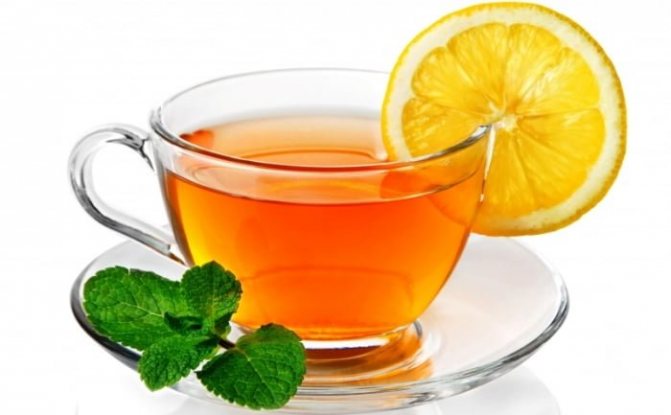
For the first time, try tea with only one ingredient. After the test, observe the baby’s reaction for two days. If spots, itching and other symptoms of skin irritation appear on the body, then the child has a food allergy. In addition, it can be expressed in the form of a runny nose and cough, nausea and vomiting. The baby's stool may change and stomach pain may appear. In this case, a nursing mother should not drink tea with lemon balm!
If there are no negative consequences, the herb can be consumed without fear, but in compliance with the rules of eating while breastfeeding.
Green tea with lemon balm: benefits and harms
When combined with green tea, lemon balm has a beneficial effect on all organs. Pofilenols reduce the risks of developing cancer and heart disease. Alkaloids accelerate the transmission of nerve impulses and increase human performance. The vitamin-mineral complex supports each of the body systems. And phenylpropanoids fight feelings of depression.
Beneficial properties of lemon balm tea
Melissa drink is especially useful for women. So, it helps reduce pain during menstruation. The drink strengthens the immune system, relieves anxiety and neurosis. It helps with colds and respiratory diseases. If you drink a cup of lemon balm tea before bed, it will help you fall asleep quickly. But green tea in the drink, on the contrary, will only excite the nervous system.
We also recommend: Garlic for coronavirus
Contraindications
But even such a healthy drink has contraindications for which it should not be consumed. For insomnia and tachycardia, caffeine contained in tea is extremely undesirable. In this case, it is better to brew simple mint. In addition, there is no need to abuse this combination on an empty stomach.
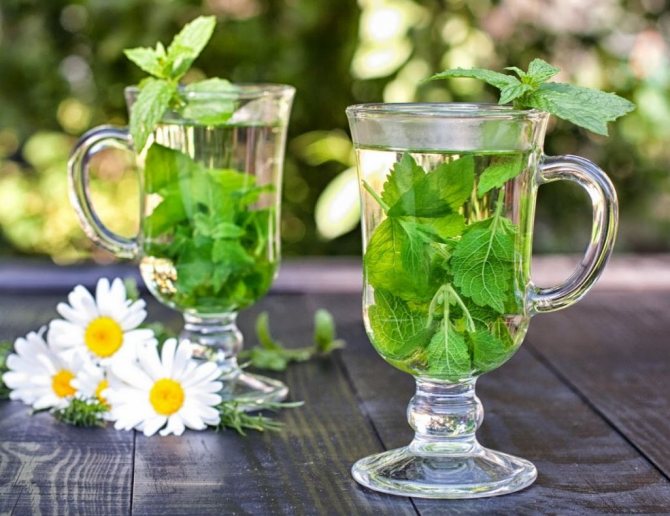
Melissa is not indicated for low blood pressure and in childhood. In men, in some cases, the drink provokes a decrease in sexual activity. Due to the sedative effect, mint can reduce attention, so it is better not to drive immediately after drinking tea. And since honey herb is a strong diuretic, it should be avoided in case of kidney failure.
Rules for drinking lemon balm tea during lactation
- To prepare, one tablespoon of dry or fresh herb is poured with a glass of boiling water. The drink is infused for 30-40 minutes;
- You should drink tea with lemon balm only warmly, preferably before bed, 1-2 hours after eating. A cold or hot drink will not have the desired effect;
- Drink no more than one cup per day;
- You should not combine tea with other sedatives, as lemon balm enhances the effect of such drugs;
- Do not drink tea before driving a car or doing work that requires concentration and attention. Melissa slows down the reaction and has an “inhibiting” effect;
- Tea with lemon balm is not recommended for nursing mothers with low blood pressure.
Restrictions and contraindications
Still, there are times when it’s worth thinking about whether lemon balm can be consumed while breastfeeding. Yes, this drink is recommended during breastfeeding, but you should pay attention to certain factors.
Since this drink has a sedative effect, it is not recommended to use it when the baby is not very active by nature and often sleeps. In this case, you should consult your doctor.
You need to carefully monitor your baby's reaction to the new component. Since the first time you use something, the body may respond with an allergic reaction. If any slight deterioration is noticeable, the mother should refuse this drink. It is better to drink tea with only one ingredient on the first day of use, and then carefully monitor the baby’s reaction. If after feeding the baby develops noticeable spots, itching or other irritations, this means that the child has a food allergy. In addition to skin irritations, allergies can manifest themselves in the form of a runny nose, nausea, and cough. Changes in stool may occur and stomach pain may begin. In this situation, drinking lemon balm is strictly prohibited. If these symptoms were not noticed, then you can continue to drink the drink in accordance with the established rules for eating during breastfeeding.
Do not forget also about the individual reaction of the mother herself to lemon balm. If the drink does not taste or smell pleasant, then it is better to choose other drinks that are approved for consumption while breastfeeding.
If, however, a nursing mother is allowed to drink tea with lemon balm, then she should learn how to brew it correctly. A nursing mother needs lemon balm with all the vitamins it contains, so they should be preserved when decoction. To do this, you do not need to use too hot water, since boiling water can remove all useful substances. For vigor, you can brew lemon balm with black tea; if you want the opposite effect - a calming effect, then it is better to brew only lemon balm leaves alone. If a woman has problems sleeping or hypertension, then you need to brew lemon balm with green tea with caution.
Recipes with lemon balm for nursing
Fresh lemon balm can not only be put into tea. The plant is used to prepare desserts, salads, soups and even meat or fish dishes. We offer several delicious and healthy recipes that will diversify the menu when breastfeeding.
Fish with white sauce

- Fillet of any sea fish – 700 g;
- Fish broth – 0.5 l;
- Flour – 1 tbsp. spoon;
- Butter – 1 tbsp. spoon;
- Vegetable oil – 2 tbsp. spoons;
- Melissa – 1 bunch;
- Salt, pepper and lemon juice.
Sprinkle the fillet with lemon juice, pepper and salt. Fry the fish pieces in heated vegetable oil. To prepare the sauce, heat the flour in butter and gradually pour in the broth. Mix the mixture thoroughly until a homogeneous consistency without lumps is formed. Finely chop the lemon balm and add to the sauce, let the mixture simmer a little. Pour the sauce over the finished fish.
French salad with fruit

- Bananas – 200 gr;
- Peeled green apples – 200 g;
- Celery – 200 gr;
- Melissa – 1 bunch;
- Yogurt – 50 gr;
- Sour cream – 50 gr.
Cut the apples into cubes, celery into thin rings, and bananas into slices. Combine the ingredients, add salt and pepper to taste, and mix. For dressing, mix yogurt and sour cream, add finely chopped lemon balm to the salad. If desired, you can add a few drops of lemon juice.
Ginger-lemon drink to increase lactation
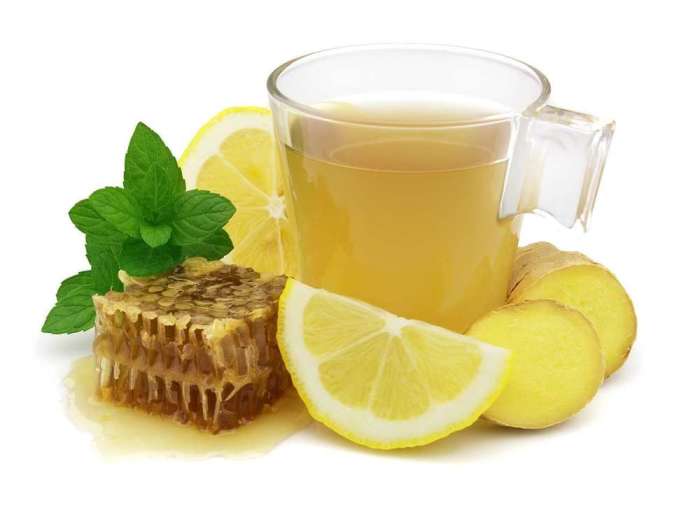
- Water – 4 liters;
- Ginger – 1 piece;
- Fresh or dried lemon balm - ½ bunch;
- Anise – 1 star;
- Green tea – 2 tablespoons;
- Lemon – 1 piece.
Cut the lemon into slices, grate the ginger root.
Place the prepared ingredients, lemon balm and green tea into boiling water. Let it boil a little and turn it off. Add anise to the finished drink; if desired, you can use cloves and cinnamon. But be careful as these are allergenic products. What other drink or tea can a nursing mother drink to increase lactation, read the link. Subscribe to our VKontakte group
Ways to use lemon balm during breastfeeding
- Fresh. One of the most popular ways in this case is as a salad ingredient. There are many salad recipes with the addition of lemon balm, but you can simply experiment by adding lemon-mint spice to your favorite everyday or holiday dishes.
- Decoction or tea of lemon balm. Fresh or dry raw materials are used, which are prepared in a water bath or by conventional brewing in a kettle. It is customary to take 1 heaped tablespoon of dry raw materials or 1 heaped tablespoon of fresh raw materials per 200 ml of boiled water at a temperature not exceeding 90°C. Higher water temperatures can cause the destruction of beneficial substances.
- Tea with lemon balm added. In this case, lemon balm is used as a flavoring and aromatic additive to an infusion of green or black tea. Usually, two or three fresh lemon balm leaves are taken per 200 ml of tea infusion.
Thus, you can add lemon balm to your diet in various ways, which will significantly improve the life and health of mother and child.
What's good about lemon balm?
Most of us are familiar with the beneficial properties of lemon balm, and many have been using it for a long time, but let’s still list them.
- “Lemon balm,” as lemon balm is often called in common parlance, has an anti-inflammatory effect, stimulates appetite, helps with digestive disorders, but the most important property for which everyone loves this aromatic plant is its natural calming and relaxing effect on the nervous system.
- In addition, tea with lemon balm relieves muscle spasms and helps the body fight colds more effectively. This herb owes its medicinal properties to the essential oils that are concentrated in its shoots and leaves, as well as vitamins B1, B2 and C.
- It improves memory, concentration and helps to better assimilate the information received, and promotes perseverance.
If your baby is restless and cannot calm down after a difficult or stressful day, he has a headache, he is very tired, but cannot fall asleep, you can offer him tea with lemon balm.
